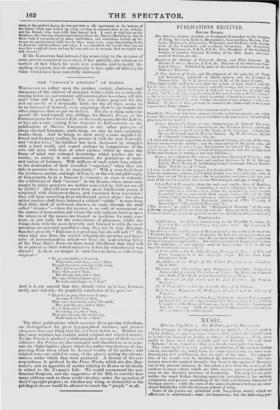TI1E " PEOPLE'S EDITION" Or BURNS.
WHENEVER we reflect upon the number, variety, character, and cheapness of the editions of standard works which are continually coming betbre us, our constant self-interrogation is—where will this end ? what Mill it produce ? The new dishes prep trod firs the rich are mostly of a despicable kind ; fin. the old there scents to be no increase of demand, even supposing their books bought for other purposes than to put on shelves. But the Nverking man who spends his hard-earned two shillings for Burns's Poems, or his fourteen-pence fbr Cur'rie's Lift, or his twenty-pence for the Letters, or lays out a sum varying from sixpence to half-a-crown on the publications of Messrs. CHAMBERS or any other purveyor of ?heap classical literature, reads them, we may be sure—probably studies them. And he brings to their study a taste unpalled by forced and frequent reading; -he pursues it with the zest of novelty and "stolen love ;" his intellect has been sharpened by struggles with a hard world, and soured perhaps by comparisons of his own sad state with that of other classes, whilst he wants the frame of mind and enlarged knowledge which teaches the ne- cessity, as society is now constituted, for gradations of ranks and variety of fortunes. Will millions of' such; minds long submit to the domination of their so-called " superiors," when they are able to perceive there is no superiority ? Will a man fresh front the keenness, matter, and logic of PALEY, or the wit and philosophy of GOLDSMITH, be in a humour to venerate, or even to tolerate, the exhibitions of their "betters" in the Senate, where mean ends sought by tricky practices are neither concealed by skill nor set off by ability ? Men will bear much from great intellectual power, if conjoined with disinterestedness, and exercised front conviction : they will bear something from intellectual power alone : but when mixed motives shall have induced a critical " rabble " to turn front their little shelf of well-read classics, to wade through the stuff called " debates "—where the manner is as void of amusement as the matter of instruction, and where the only subjects bearing upon the interests of the masses are treated as positions for party con- tests, or put aside for the convenience of place men, whilst the things done with the most dexterity and listened to with the most attention are personal squabbles—may they not in time illustrate Sancho's proverb, " Patience is a good nag, but she will bolt ? " Or, when they rise from the satirist stripping the pretence and hypo- crisy of conventionalism naked—or front the soul-stirring lyrics of the Poor Man's Poet—is there much likelihood that they will be as patient as their doltish ancestors, befbre the schoolmaster was abroad ? is there no danger in such lines as these, and the living originals? " Ye we you birkie, ea'd a lord, What struts, and stares, and a' that ;
Thought hundreds worship at his word,
Ile-s but a cooffor a' that :
For a' that, and a' that, His ribaud, star, and a' that, Tic man of independent mina, Be looks and laughs at a' that."
And is it not natural that they should strive to hasten, however rashly and violently, the prophetic conclusion of the poet ?—
" Then let I.18 pray that cite it may, As come it will for a' that, That scow 111111 worth, o'er a' the earth, May bear the tree, and a' that : For at that, at h' that, Its coining yet, for a' that, That man to man, flue world o'er, Shall brothers be fur a' that."
The three publications which occasion these passing reflections, are distinguished for great typographical neatness, and greater cheapness than any thing that has yet been befbre us. Neither arc they mere reprints, but contain much original and selected matter. To the Poems is prefixed a bibliographical account of their several editions; the Poems arc also arranged and classified so as to sepa- rate the slight l'ititive pieces which the author was desirous of sup- pressing, from Sose which he deemed worthy of his genius ; and original notes notes are added to many of the pieces, stating the circum- stances under which they were produced. A history of his cor- respondence is prefixed to the Prose Works, which are also illus- trated; and an appendix of matter relating to BURNS or his finally is added to Dr. CURRIE'S Life. We would recommend the sen- timental Sergeant, and the supporters of his Bill, to consider how many editions such as these would circulate under the operation of their Copyright project ; or whether any thing so distasteful to the privileged classes would be allowed to reach the " people " at all.


























 Previous page
Previous page